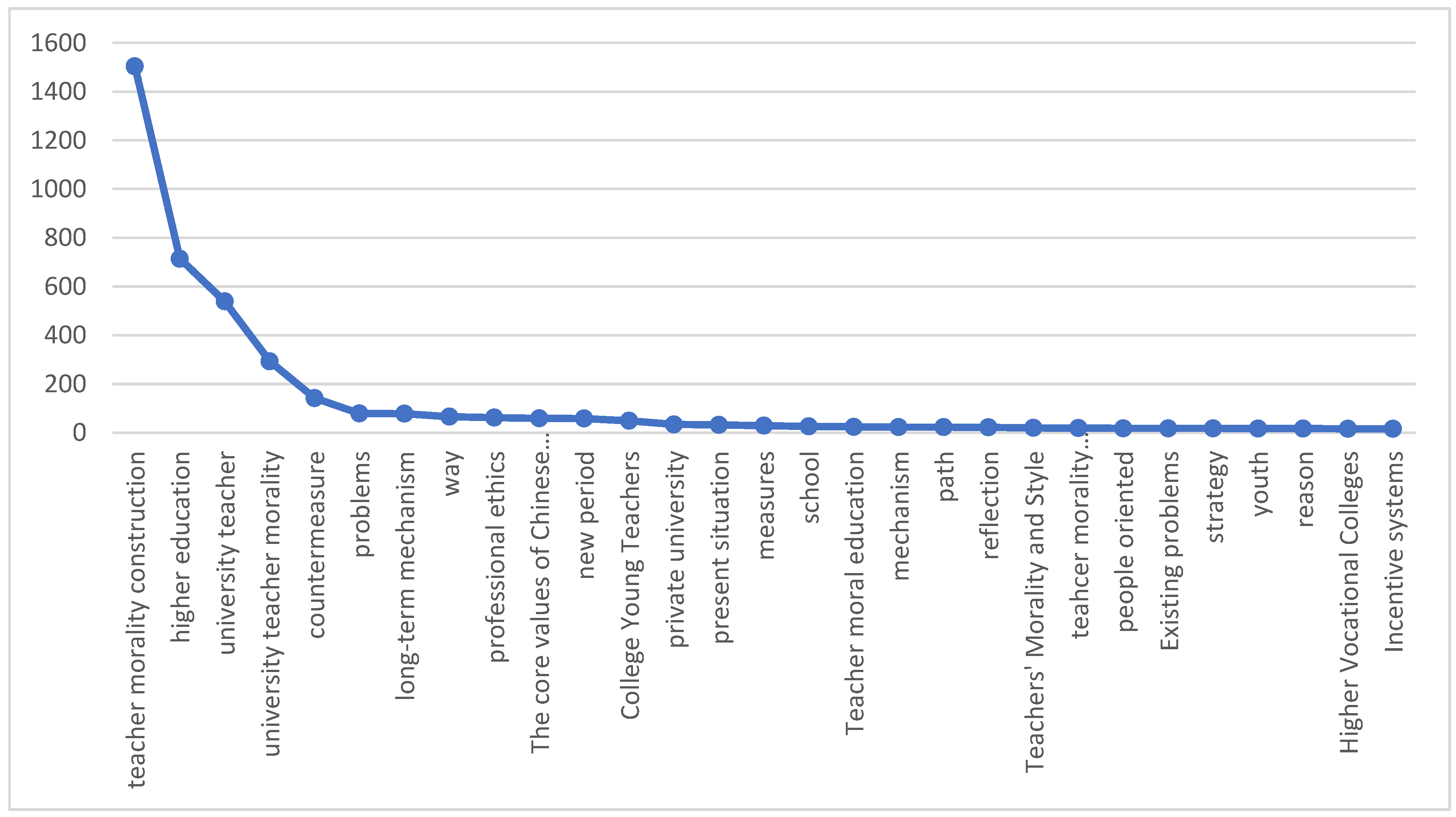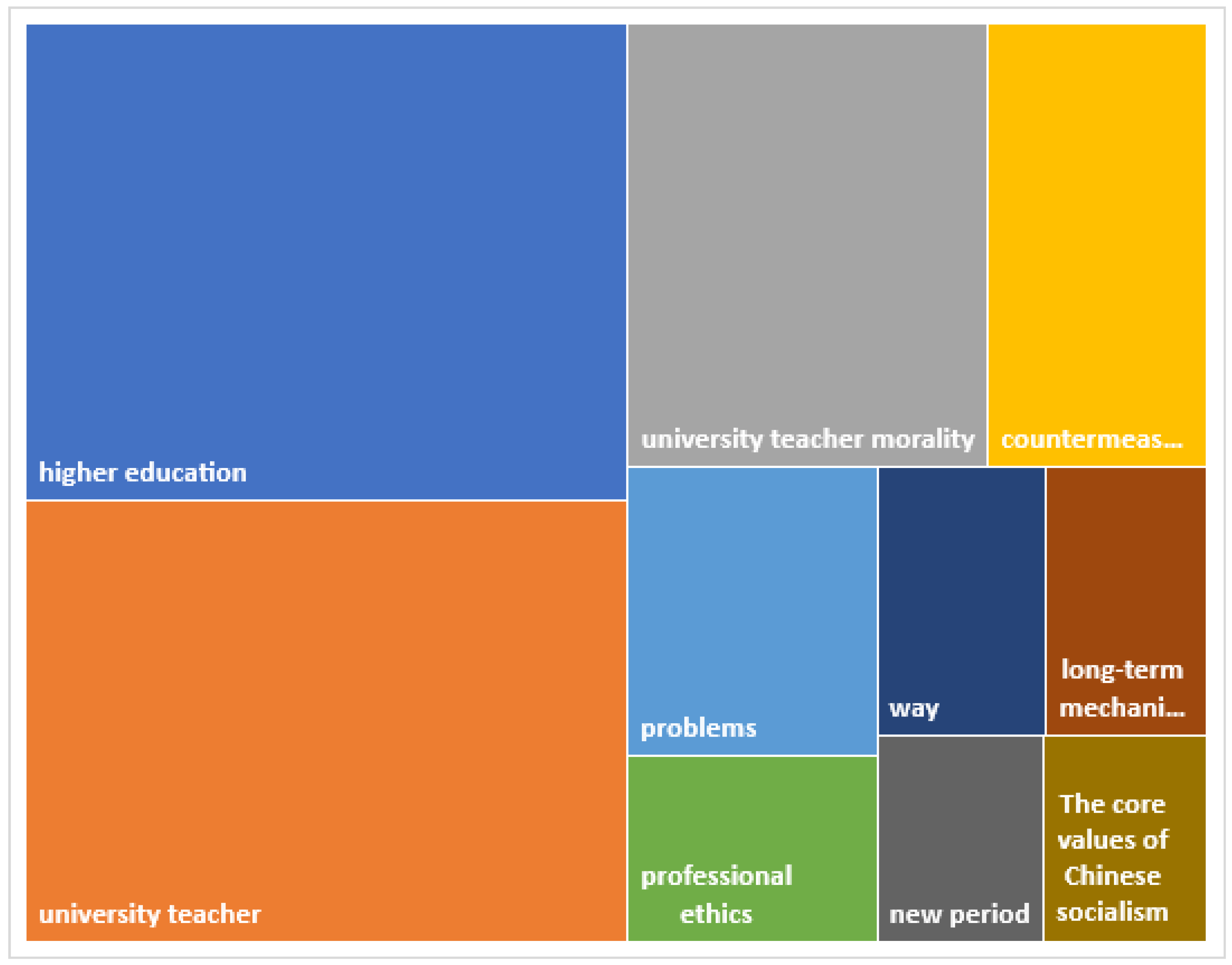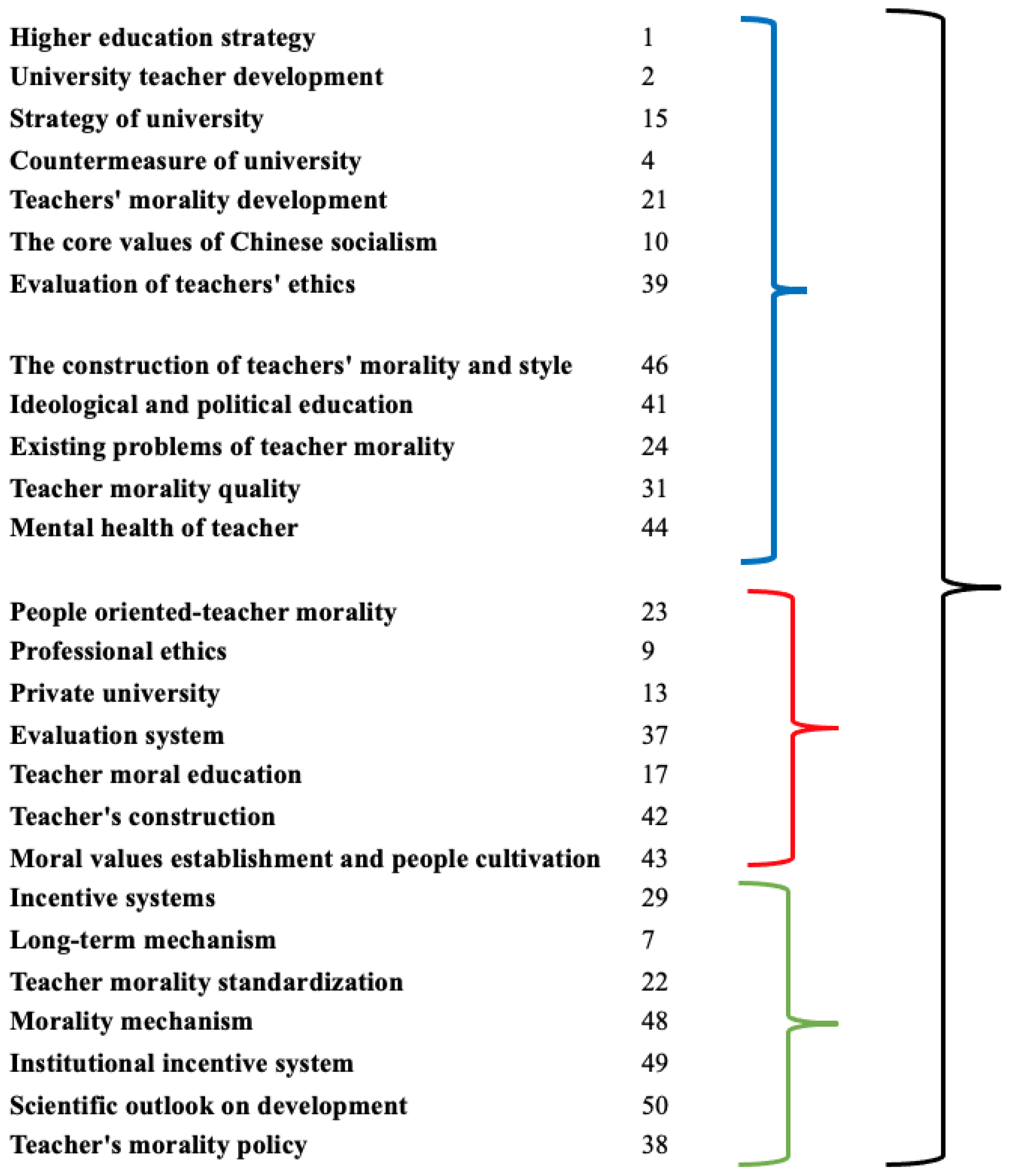Applying Latent Allocation Topic Model to Explore the Policy Changes of Teachers’ Morality Development for Teacher Educational Sustainability in China
Abstract
:1. Introduction
2. The Historical Policy Changes of Teachers’ Morality Construction in Colleges and Universities in China
2.1. The Policy Exploration Period of Teacher Ethics Construction (1949–1978)
2.2. The Policy of Teacher Ethics Construction (1978–2000)
2.3. Policy Attention Period of Teacher Ethics Construction (2000–2010)
2.4. The Policy Improvement Period of Teacher Ethics Construction (2010-Present)
3. Method
3.1. The LDA Topic Model as One Content Analysis Approach
3.2. Study Design and Data Source
4. Results
4.1. High-Frequency Word Analysis
4.2. Analysis of Centrality
4.3. The Cluster Analysis
5. Discussions
6. Conclusions and Suggestions
Author Contributions
Funding
Institutional Review Board Statement
Informed Consent Statement
Data Availability Statement
Conflicts of Interest
References
- Li, J.; Yongzhi, Z.; Eryong, X.; Zhou, N. Faculty ethics in China: From a historical perspective. Educ. Philos. Theory 2020, 52, 126–136. [Google Scholar] [CrossRef]
- McKay, R.B.; Kidwell, L.A.; Kling, J.A. Faculty ethics from the perspective of college of business administrators. J. Leg. Ethical Regul. Issues 2007, 10, 105. [Google Scholar]
- Morgan, B.L.; Korschgen, A.J. The ethics of faculty behavior: Students’ and professors’ views. Coll. Stud. J. 2001, 35, 418–423. [Google Scholar]
- Reybold, L.E. Faculty ethics: Ideal principles with practical applications. J. Vet. Med. Educ. 2009, 36, 375–381. [Google Scholar] [CrossRef] [PubMed]
- Sandler, J.C.; Russell, B.L. Faculty-student collaborations: Ethics and satisfaction in authorship credit. Ethics Behav. 2005, 15, 65–80. [Google Scholar] [CrossRef]
- Dean, K.L.; Beggs, J.M.; Fornaciari, C.J. Teaching ethics and accreditation: Faculty competence, methods and assessment. J. Bus. Ethics Educ. 2007, 4, 5–25. [Google Scholar]
- Rich, J.M. Professional Ethics in Education; Thomas, C.C., Ed.; Springfield: Geneseo, IL, USA, 1984. [Google Scholar]
- De Wet, K. The Importance of Ethical Appraisal in Social Science Research: Reviewing a Faculty of Humanities’ Research Ethics Committee. J. Acad. Ethics 2010, 8, 301–314. [Google Scholar] [CrossRef]
- Keith-Spiegel, P.; Whitley, B.E., Jr.; Balogh, D.W.; Perkins, D.V.; Wittig, A.F. The Ethics of Teaching: A Casebook; Psychology Press: London, UK, 2003. [Google Scholar]
- Sherer, R.; Dong, H.; Cong, Y.; Wan, J.; Chen, H.; Wang, Y.; Ma, Z.; Cooper, B.; Jiang, I.; Roth, H.; et al. Medical ethics education in China: Lessons from three schools. Educ. Health 2017, 30, 35. [Google Scholar] [CrossRef]
- Zhang, R.; Gao, F. A Review of the Historical Experience of College Teachers’ Ideological and Political Work—The early period of the founding of New China. People’s Forum 2014, 26, 156–158. [Google Scholar]
- Chen, H. Strengthening and Improving the Ideological and political Work of Young Teachers in Universities and College. Educ. Occup. 2014, 20, 83–84. [Google Scholar]
- Gao, L. Investigation and Analysis of the Ideological Situation of Young Teachers in Colleges and Universities. Sch. Party Constr. Ideol. Educ. 2014, 20, 45–47. [Google Scholar]
- Cui, L.; Wang, C. An intelligent q&a system based on the lda topic model for the teaching of database principles. World Trans. Eng. Technol. Educ. 2014, 12, 26–30. [Google Scholar]
- Wang, Y.; Cai, J. An intelligent led lighting control system based on the internet of things. Electron. Sci. Technol. 2016, 20, 11–19. [Google Scholar]
- Chen, Y.; Li, Y. Investigation and reflection on the Ideological situation of young teachers in colleges and universities in Hainan Province. Sch. Party Build. Ideol. Educ. 2014, 20, 48–49. [Google Scholar]
- Wang, H. On the Innovation of Ideological and Political Work of College Teachers. Sch. Party Build. Ideol. Educ. 2014, 20, 38–39. [Google Scholar]
- Tan, Q. Lifelong Education cannot be forgotten corner: The improvement of adult Quality—Taking the Ideological and political Education of Young teachers in Colleges and Universities as an example. Mod. Distance Educ. 2013, 20, 74–78. [Google Scholar]
- Dong, L.; Zhao, Z. Construction of evaluation system of moral education teachers in colleges and universities from the perspective of ethics. Heilongjiang High. Educ. Res. 2013, 31, 98–100. [Google Scholar]
- Yang, S. Current Situation and Coping strategies of Ideological and Political Education of Young Teachers in Colleges and Universities. Sch. Party Build. Ideol. Educ. 2013, 20, 81–83. [Google Scholar]
- Zhang, Y. Countermeasure Thinking on Strengthening Ideological and Political Education of University Teachers in the New period. Sch. Party Build. Ideol. Educ. 2013, 20, 73–75. [Google Scholar]
- Jin, W. Strengthening the construction of teaching style and learning style and improving the quality of personnel training. China High. Educ. 2013, 20, 59–60. [Google Scholar]
- Cai, L. Research on the Strategy of Teacher Ethics Construction in Colleges and Universities in the New Period. Sch. Party Constr. Ideol. Educ. 2013, 20, 51–53. [Google Scholar]
- Wang, Z. Countermeasures of Ideological and Political Education for Young Teachers in Colleges and Universities under the background of Social Transformation. J. Anhui Norm. Univ. Humanit. Soc. Sci. Ed. 2012, 40, 771–774. [Google Scholar]
- Guo, F. On the Construction of College Teachers’ Moral Education View. Ideol. Educ. Res. 2021, 20, 88–90. [Google Scholar]
- He, A. The construction of Teachers’ Ethics and the improvement of the Effectiveness of moral education in colleges and universities. Heilongjiang High. Educ. Res. 2010, 20, 75–77. [Google Scholar]
- Yang, H.; Chen, X. On the moral education consciousness of college teachers and its cultivation. Educ. Explor. 2010, 20, 111–112. [Google Scholar]
- An, X.; Xu, F. Reflections on the current construction of teachers’ ethics in universities. Acad. Forum 2009, 32, 196–200. [Google Scholar]
- Wu, M.; Zeng, Y. Discussion on Strengthening Ideological and political Education of Young Teachers in Colleges and Universities in the New period. Educ. Occup. 2008, 20, 135–136. [Google Scholar]
- Huang, Z. On the Construction of Teachers’ Ethics in colleges and Universities. J. Southwest Univ. Natl. Humanit. Soc. Sci. Ed. 2006, 20, 218–221. [Google Scholar]
- Zhong, Z. Reflections on Strengthening Ideological and political Education of college teachers. China Adult Educ. 2006, 20, 32–33. [Google Scholar]
- Wang, D. Problems and correction of Teachers’ ethics construction in colleges and universities. Educ. Explor. 2004, 20, 84–85. [Google Scholar]
- Li, T. The Influence of the particularity of higher education and teaching on Teachers’ Moral Construction. China High. Educ. Res. 2002, 20, 73–95. [Google Scholar]
- Yu, Q. Teacher Ethics: The Value Implication and practice path of improving the education ability of primary and secondary school teachers. Chin. J. Educ. 2022, 20, 80–85. [Google Scholar]
- Tian, T.; Cheng, H. Ways to improve Teachers’ Moral Cultivation in Universities. High. Educ. China 2022, Z1, 37–39. [Google Scholar]
- Lin, C.; Huang, S. Cultivating Good Teachers with “Four Qualities” as the goal to Cultivate Noble Teachers’ Moral Cultivation—The Key Issues in the effective Implementation of the Curriculum Guidance Standard for Teachers’ Training in Primary and Secondary Schools. People’s Educ. 2022, 20, 45–47. [Google Scholar]
- Liu, Z.; Lu, X. On the institutional causes of Teachers’ moral anomie. Teach. Educ. Forum 2021, 34, 36–42. [Google Scholar]
- Li, J.; Li, K. The Outstanding Teacher Plan in the Underdeveloped Central and Western Regions: A Macro-Level Policy Analysis. Beijing Int. Rev. Educ. 2022, 4, 498–550. [Google Scholar] [CrossRef]
- Xie, Y. On the focus of the Construction of Rural Teachers’ Ethics in the New Era. Teach. Educ. Forum 2022, 35, 30–33. [Google Scholar]
- Jiao, S. An Analysis on the Path of Teacher Ethics Construction in Colleges and Universities in the New Era. Heilongjiang Educ. Theory Pract. 2022, 20, 31–34. [Google Scholar]
- Wei, L. Strengthening the Construction of Teachers’ Ethics and Improving Teachers’ Scientific Research Integrity. J. Liaoning Teach. Coll. Soc. Sci. Ed. 2022, 20, 129–131. [Google Scholar]
- Fang, Y.; Wang, Y. Socialist core values under the vision of young university teachers’ ethics construction. J. J. Tonghua Norm. Coll. 2021, 20, 35–41. [Google Scholar]
- Zhu, Y.; Guo, M. The influence of the labor contract of university teachers’ ethics level research. J. Jiangsu Univ. Soc. Sci. Ed. 2021, 23, 102–113. [Google Scholar]
- Li, J. Financial Policy for Promoting Equality Education in Rural Areas: Two Key Policy Implementation in China. Beijing Int. Rev. Education. 2022, 4, 505–511. [Google Scholar] [CrossRef]
- Xie, A.; Guo, C.; Guo, Y. The exploration of the cultivation path of college teachers’ ethics from the perspective of ideology and politics. Educ. Teach. Forum 2021, 20, 101–104. [Google Scholar]
- Zhang, X.; Wang, X. A brief analysis of the legalization of teachers’ moral behavior in colleges and universities. Educ. Teach. Forum 2021, 21, 45–48. [Google Scholar]
- Kang, Y. University teachers’ ethics anomie behavior correction mechanism theory slightly. J. Party Constr. Ideol. Educ. Sch. 2021, 20, 29–30. [Google Scholar]
- Wang, C. The Construction of Teachers’ Ethics in Chinese Primary Schools in the first half of the 20th century and its Enlightenment. Educ. Cult. 2020, 12, 15–23. [Google Scholar]
- Yan, W. Exploration on the Construction mechanism of Teacher Ethics for Young Teachers in Colleges and Universities in the New Era. Ind. Technol. Forum 2020, 19, 249–250. [Google Scholar]
- Hao, L.; Fu, Z. On the Role of college teachers’ Ethics in teaching. Intelligence 2020, 20, 152. [Google Scholar]
- Gan, Y. Construction of moral standards of young teachers in universities in the new era of studies. J. Contemp. Educ. Pract. Teach. Res. 2020, 20, 144–145. [Google Scholar]
- Wang, I. University teachers’ ethics Delphi. J. Int. Public Relat. 2020, 20, 244. [Google Scholar]
- Kong, L. Research on the Evaluation System of Teachers’ Ethics in Colleges and Universities. Think Tank Times 2020, 20, 234–235. [Google Scholar]
- Huang, X. Research on the Present Situation and Development Countermeasures of Physical Education Teachers’ Moral Construction in Guangzhou Urban Middle School. Contemp. Sport. Sci. Technol. 2020, 10, 163–165. [Google Scholar]
- Tang, M. Strategies for building Rural Teachers’ Ethics in the new era. Chongqing World 2018, 2018, 61–62. [Google Scholar]
- Wan, M.; Li, F. Morality: A new era of the revitalization of the teacher education foundation engineering. J. Ideol. Theor. Educ. 2018, 20, 20–25. [Google Scholar]
- Fu, H.; Zou, C. Teacher development to build long-term effective mechanism for the university teacher’s ethics construction. J. North China Univ. Soc. Sci. Ed. 2018, 12, 137–141. [Google Scholar]
- Li, J.; Xue, E. “Sustainable or unsustainable” in higher education internationalization development: Exploring the post-doctoral system in the humanities and social sciences. Sustainability 2022, 14, 11024. [Google Scholar] [CrossRef]
- Li, J.; Xue, E. A social networking analysis of education policies of creating world-class universities for higher education sustainability in China. Sustainability 2022, 14, 10243. [Google Scholar] [CrossRef]
- Li, J.; Xue, E. Unpacking the policies, historical stages, and themes of the equality education development: Evidence from China. Sustainability 2022, 14, 10522. [Google Scholar] [CrossRef]




Publisher’s Note: MDPI stays neutral with regard to jurisdictional claims in published maps and institutional affiliations. |
© 2022 by the authors. Licensee MDPI, Basel, Switzerland. This article is an open access article distributed under the terms and conditions of the Creative Commons Attribution (CC BY) license (https://creativecommons.org/licenses/by/4.0/).
Share and Cite
Li, J.; Xue, E. Applying Latent Allocation Topic Model to Explore the Policy Changes of Teachers’ Morality Development for Teacher Educational Sustainability in China. Sustainability 2022, 14, 16125. https://doi.org/10.3390/su142316125
Li J, Xue E. Applying Latent Allocation Topic Model to Explore the Policy Changes of Teachers’ Morality Development for Teacher Educational Sustainability in China. Sustainability. 2022; 14(23):16125. https://doi.org/10.3390/su142316125
Chicago/Turabian StyleLi, Jian, and Eryong Xue. 2022. "Applying Latent Allocation Topic Model to Explore the Policy Changes of Teachers’ Morality Development for Teacher Educational Sustainability in China" Sustainability 14, no. 23: 16125. https://doi.org/10.3390/su142316125
APA StyleLi, J., & Xue, E. (2022). Applying Latent Allocation Topic Model to Explore the Policy Changes of Teachers’ Morality Development for Teacher Educational Sustainability in China. Sustainability, 14(23), 16125. https://doi.org/10.3390/su142316125






